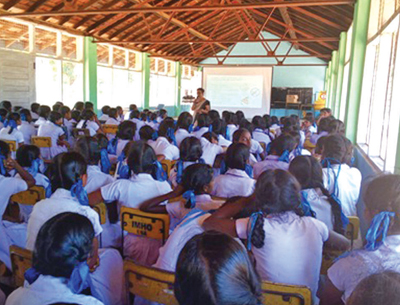The H.E.R Foundation initiated by Fems, driven by a mandate to help women overcome challenges they face in their lives through initiatives based on its core pillars: Help, Empower, and Rise, marked its first milestone year, recommitting to breaking down societal barriers.
The journey began with Fems, a feminine hygiene care brand by Hemas Consumer Brands, having recognised the call to redefine the narrative surrounding menstrual health in Sri Lanka and addressing critical issues through transformative change.
 According to a study conducted by WaterAid and the UNICEF Regional Office for South Asia on menstrual hygiene management in schools in South Asia, 66 percent of Sri Lankan girls are unaware of menstruation until menarche. About 60 percent of parents do not allow their daughters to go to school during their periods. For far too long, women and girls have faced challenges in receiving proper education, accessing essential menstrual hygiene products, and overcoming societal taboos surrounding this natural biological process.
According to a study conducted by WaterAid and the UNICEF Regional Office for South Asia on menstrual hygiene management in schools in South Asia, 66 percent of Sri Lankan girls are unaware of menstruation until menarche. About 60 percent of parents do not allow their daughters to go to school during their periods. For far too long, women and girls have faced challenges in receiving proper education, accessing essential menstrual hygiene products, and overcoming societal taboos surrounding this natural biological process.
Evidence suggests that in Sri Lanka, lack of education, and generational habits, have contributed to perpetuate the stigma surrounding menstruation. The reality of menstrual health and hygiene poses a significant challenge, as an alarming 70 percent of women who menstruate do not choose the correct menstrual hygiene options such as sanitary napkins.
Recognising the gravity of the situation, Fems took a stance in 2021 with a two-pronged approach aimed at tackling period poverty and promoting menstrual health education, through the launch of the AYA initiative.
The AYA initiative aimed to empower women and girls by introducing the AYA Sanitary Napkin, a high-quality yet affordable option designed to make hygienic menstrual care accessible to all.
Having understood that affordability was just one aspect of the challenge, it was crucial to educate young girls and women about their reproductive health and address the deep-rooted stigma and misinformation surrounding menstruation. In collaboration with medical professionals, the brand conducted awareness sessions across the country, educating women and girls about menstrual health, proper hygiene practices, and dispelling harmful myths that had been passed down for generations.
Fems launched the H.E.R Foundation on May 28, 2023, as a move to challenge societal norms and spark conversations that had long been suppressed.
As it marks a year of achievements, the H.E.R Foundation is guided by the principle of ‘Help’ where the primary focus aims to address period poverty in Sri Lanka through education and awareness programs. Through ‘Empower’, the Foundation seeks to break the taboo around menstruation by promoting easy access to sanitary products in schools and workplaces and changing societal attitudes. It seeks to inspire future generations of women to ‘Rise’ by celebrating and highlighting successful women from various fields, inspiring future generations to reach their full potential.
To improve accessibility, the Foundation introduced sanitary napkin dispenser units in schools, workplaces and coffee shops ensuring that women and girls had convenient access to these essential products, enabling them to continue their daily activities unhindered.
One of the Foundation’s recent initiatives under the ‘Empower’ pillar was the introduction of an automated WhatsApp chatbot called ‘Fio’ by Fems, available at the number 0765654661. All questions are answered by medical experts creating a safe and accessible platform for open discussions about menstruation and addressing related concerns.
To continue its efforts in breaking the misinformation and taboos surrounding menstruation, the Foundation keeps educating schoolgirls, women in the plantation and apparel sectors, as well as midwives. These midwives, in turn, can educate households, ensuring that accurate information reaches a broader audience.The Foundation has educated over 250,000 girls and women about good menstrual health and hygiene.
The H.E.R Foundation identified a critical need in Sri Lankan prisons, that female inmates often lack access to essential sanitary products. In response, the Foundation launched a monthly distribution initiative to provide requisite items, reinforcing the belief in universal right to proper hygiene practices.









